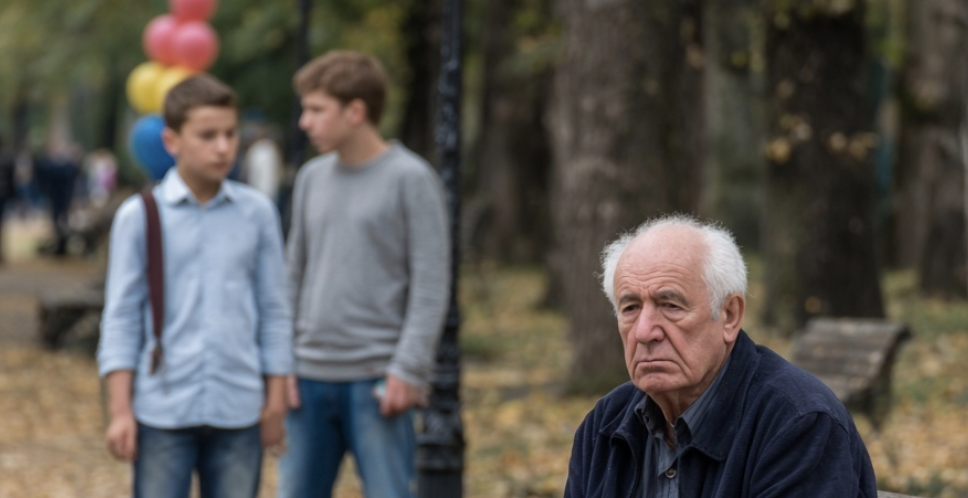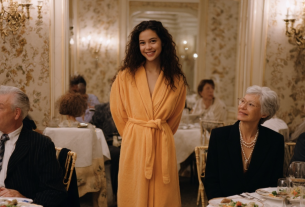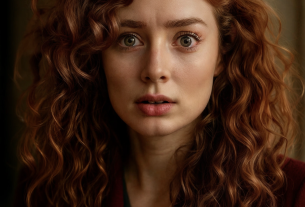A warm, golden autumn evening wrapped the city in a soft glow, as if the heavens themselves had decided to add a drop of magic to the day. The air was thick with the scent of wet leaves soaked by rain and the lingering warmth of the departing summer, with the smell of freshly baked bread from the nearby bakery, and children’s laughter ringing like little bells scattered on the wind. Dima walked along a familiar street—the street of his childhood, where every house, every lamppost kept the echoes of days long past. In his palm lay a small hand, held tight and trustingly—his son Seryozha’s, the light of his life, his smile, his hope. The boy, eyes sparkling with curiosity, kept turning his head to his father and, each time as if for the first time, asked:
“Papa, are we there soon?”
Dima nodded automatically, whispering:
“Yes, son, almost…”
But his mind drifted far away—beyond the bounds of this warm evening, beyond the edge of the present. It carried him into the past, back to a time when he himself was just as small and timid, when he held his adoptive father’s hand and asked hundreds of questions adults often didn’t want to hear. Back then that man—Gena—had become everything to him: a support, a protector, a voice of reason in a world that seemed too big and too cruel. He was not just a father—he was a miracle.
They reached a spacious playground ringed by trees dressed in crimson and gold. Here, among swings, slides, and sandboxes, life bustled. Mothers in coats and scarves sat on benches, chatting, laughing, watching their children. Grandmothers with warm blankets on their knees drank tea from thermoses, and nannies, phones in hand, did not take their eyes off the romping toddlers. Dima found a free bench—old and worn, but sturdy, like memory. He sat down, gently pulled Seryozha close, and, looking into his shining eyes, said:
“Go play, son. I’ll wait right here. I’m nearby.”
The boy squealed with delight like a fledgling released into the sky and dashed to the slide, where children were already hurtling down with shrieks. His laughter, pure and bright, spread across the yard like music awakening forgotten feelings.
And Dima was left alone—alone with his pain, with his memories, with the shadow of the past that trailed him like a long autumn glint.
The Burden of the Past: A Path Through Darkness
His life did not begin with a lullaby but with tragedy. When Dima was only two years and eleven months old, his parents died in a terrible car crash on an icy highway. The car they got into that morning to visit his grandmother became a tomb. No warnings, no farewells—only the roar of torn metal and silence.
Only his grandmother—his mother’s mother—remained. But she was broken, not only by grief, but by illness. After the death of her daughter and son-in-law, it was as if her heart stopped beating. She could no longer get out of bed, could barely speak, could hardly eat. And when, six months later, she followed her children, Dima was left an orphan. Completely alone. Without a family. Without a home. Without a future.
The apartment where he had grown up was sold for pennies—to cover debts. Even his favorite toy—a wooden horse his father had given him—was taken away during the move. He didn’t understand what was happening. He only remembered being led down a long corridor with green walls, how he cried, how they sat him on a bus, and how the streets flickered past the window—streets he would never see again.
The orphanage. Cold walls. A bed that smelled of strangers. Stern caregivers. Children who laughed when you cried. Nights full of nightmares. Days filled with loneliness.
But into that darkness, light burst in.
Six months after he entered the orphanage, someone came for him. Inna and Gennady—a couple who had dreamed of children but had never managed to have them—saw his photo in the files, and something inside them stirred. They came, and when Dima saw them—especially Inna, with her warm eyes and gentle hands—he felt, for the first time in a long while, that he could breathe.
They took him home. Called him their son. Bought new clothes and toys, brought him to a cozy apartment with a carpet and windows that looked out on trees. Inna sang him to sleep at night; Gena taught him to climb trees; and Dima began to believe that maybe miracles did exist after all.
But fate struck again.
Three years later, Inna died. A car hit her at a crosswalk. Dima saw it—from their apartment window. He saw her fall. He heard her cry. He watched blood spread across the asphalt. He ran downstairs, but it was too late. The car drove off. His mother was gone.
Gena broke. He tried to be strong, but the pain was too great. He began to drink. At first—a glass in the evening. Then—a bottle. Then—anything he could find. He stopped working. Stopped leaving the house. Stopped noticing his son.
One day a neighbor, an elderly woman with kind eyes, looked in on them. She saw Dima sitting in a corner, hungry, in dirty clothes, while Gena slept on the couch with a bottle in his hand. She couldn’t bear it.
“Gena,” she said quietly, “you’re losing your son. He looks at you like you’re a stranger. You have to wake up!”
“Leave me alone!” he barked. “I know what I’m doing!”
But she didn’t back down. The next day she called child protective services.
A week later they came for Dima.
He screamed. Clung to his father’s leg. Begged:
“Papa, don’t let me go! I’ll be good! I won’t make noise! I’ll do everything you say!”
Gena, roused from his drunken stupor, struggled to focus. His face twisted with pain.
“Son… This is only for a little while. I’ll come for you. I promise.”
“You promise?” Dima sobbed, looking at him with such faith that Gena’s heart tore in two.
“I promise.”
But the promise gathered dust. A week. A month. Six months. A year. Every day Dima looked out the window and waited. But his father didn’t come.
And then he was adopted. New parents—a kind teacher and his wife—took him to another city. They gave him a new first name, a new last name, a new life. They loved him. They cared for him. But Dima knew that part of his heart remained back there, in the past, with Gena.
Homecoming: The Road Home
Years passed. Dima grew up. He became strong, intelligent, kind. He became a teacher—like his second father. He fell in love with a woman who looked at him with the same tenderness Inna once had. They had a son—Seryozha. And soon a daughter was due to be born.
But the heart did not forget. It remembered Gena. It remembered his hands, his voice, his promise.
And so, twenty years later, Dima returned to his hometown. Not for memories. Not for nostalgia. He came to find the truth.
He found the old apartment. It was gone. In its place stood a new housing complex. He tracked down the former neighbor. She told him through tears:
“Gena… He fell ill. Cancer. He sold the apartment and left to get treatment. No one ever saw him again. Maybe he died. Maybe he’s alive… But he didn’t forget you. Before he left he said, ‘If my son comes—tell him… I couldn’t, but I loved him to the very end.’”
Dima stood in the street feeling the ground slip away beneath his feet. His father hadn’t abandoned him. He simply couldn’t come. He fought. He was dying. But he remembered.
The Meeting: Tears and Forgiveness
At the playground, Seryozha suddenly stopped. He had spotted an old man on a distant bench. The man sat hunched over, eyes empty, holding a tattered bag. A ball lay at his feet.
“Grandpa, may I take the ball?” Seryozha asked, coming closer.
The old man flinched. He looked up. It was Gennady. Gray, gaunt, his face scored by years and pain.
“Of course, little one, take it,” he whispered.
But the boy didn’t leave.
“Why are you crying?”
“The sun… it’s shining right in my eyes,” Gena answered, wiping his tears.
“I’ll bring you some water!” And Seryozha dashed off to his father.
A minute later he returned—with a bottle of water, a pastry, a warm scarf… and a man whose face was achingly familiar to Gena.
The old man raised his eyes.
And the world stopped.
“Dad…” Dima whispered, his voice trembling like an autumn leaf.
Gena began to shake. In his eyes flared a light he had thought extinguished forever.
“Son… Is it… is it you?”
Beaming, Seryozha cried out:
“Papa! We found Grandpa! I knew he was alive!”
Dima dropped to his knees. With trembling hands, Gena touched his face, as if testing whether this was a dream or waking life.
“Forgive me, son… I didn’t want to… I tried…”
“I know, Dad. I know everything.”
They embraced. Long. Tightly. As if two lost worlds had finally converged at a single point.
And in that moment—beneath the rustle of leaves, the child’s laughter, the soft whisper of the wind—they finally came home. Not to a house of brick and wood, but to the home that had always lived in their hearts. A home built on love, pain, forgiveness, and faith.



